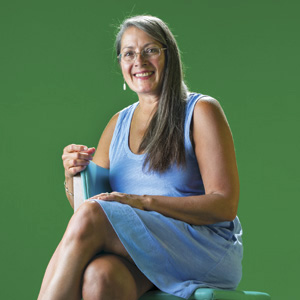Alex Robinson
Band Director, Washington-Lee High School, Arlington
Years teaching: 27
– I’m tough, but believe it or not, the kids are hungry for structure. If they come in and there are no instructions on the board, it’s like a bright headlight shining in their eyes. They don’t know where to go or what to do.
– I used to check every marching band uniform after every game. It would take forever. Now I let the section leaders do it. Maybe I’m just being smarter.
– There were advantages to being a 1,200-kid school. Now that we have 1,800 students, we still have a staff meeting once a month, but it’s really just a business meeting.
– Kids segregate themselves in the cafeteria. Teachers do the same thing in the staff lounge. You see older teachers over here and younger teachers over there.
– Today there are more state requirements, more testing, more AP and IB classes. I’m sure many of us adults would struggle with the schedules these kids have.
– At the start of every school year, I allow each of the new students to ask me one personal question, within reason. They only get one opportunity to do this. Most of them are surprised that I am so candid with my answers. The students need to understand that we, as teachers, are human and that we know how to live as well as teach.
– I don’t believe in summer assignments. Life is short.
– When something’s over, it’s over. I go out and kiss the 50-yard line goodbye on the last football game of every season.
– I can come to school with a cold, feeling achy or tired, and I get in front of these bands, and whatever’s ailing me, it just goes away. They’re that good.
—L. Carol Ritchie
Matt Hubbard
Science Teacher, Thomas Jefferson Middle School, Arlington
Years teaching: 7
– The most successful science fair projects are the ones that students come up with on their own.
– Some days we get way off topic. I like to follow their train of interest. It engages them more, so that they are more interested when we have to get back to the science.
– When you homogenize classes by putting all the high achievers in one and lower achievers in another, the low-achieving students don’t have role models for what good students look like.
– You can’t really underestimate anybody.
– I am mindful of Maslow’s “hierarchy of needs.” Students can only move on to a higher level of critical thinking if they feel safe and comfortable. They need to know that their presence is important to me. So much of middle school is emotional.
– One-on-one time makes a difference. One girl said to me, “I can’t find anything to do for my science project. I don’t like science.” I asked, “Well, what are you interested in in school?” She answered, “I don’t like school; the teachers are mean.” I said, “OK, let’s do a science project about that.” Her eyes lit up. We designed a project to study whether students’ grades are affected if they think their teacher is mean. That opened up a connection between her and me.
– Teaching is limitless. I find there is almost nothing I wouldn’t do to help a kid.
—L. Carol Ritchie
Cintia Johnson
Incoming Assistant Superintendent–Administrative Services, Arlington Public Schools and former Principal, Claremont Immersion School, Arlington
Years as a teacher: 17
Years as a school administrator: 20
– Elementary school is the critical foundation to all future success.
– Teaching is like motherhood in some ways: When you first start out, you are unsure and try to do what is right. If you’re smart you take your cues from the child and you learn.
– Like parenthood, education allows us to help students grow and blossom into beautiful human beings. The only difference is that at the end of the day, each child goes home.
– It is instantly rewarding to see a parent’s face light up when I can communicate in their language.
– A smile on a given day can make the difference in the life of a child.
– When the building is empty and the children enter through that door in the morning—that’s the most exciting time.
– We do better figuring things out collectively or collaboratively than we do in isolation.
– In today’s world, anyone with the advantage of speaking multiple languages has just that: an advantage. Bilingualism is a gift that no money can buy.
– It is amazing what you learn about other people by just listening and watching.
– Our motto is “Strive for the highest and work to create a better world.” Or, in Spanish: “Me esforzaré por lograr las metas más altas y trabajaré para crear un mundo mejor.” I believe we do that.
—Madelyn Rosenberg
Vern Williams
Math Teacher, Longfellow Middle School, Falls Church/McLean
Years teaching: 38
– The difference between seventh- and eighth-graders is night and day. Seventh-graders are happy to see you; eighth-graders will avert their eyes in the hallways and pretend you don’t exist. I tell the young teachers: It’s happened for thousands of years. Don’t take it personally.
– Don’t have tons of rules. Have a few rules, and enforce them.
– Pictures in a math textbook are worth almost zero. I don’t want a chapter that’s infested with pretty photos, tables and other stimuli. I just want to solve a quadratic equation.
– You don’t have to con kids into learning by entertaining them. They are more intellectual than you think.
– People often assume you are on a higher plane if you teach math. Then everything changes when you tell them you teach middle school. They say, “Oh you poor, poor man! What can I bring you? Can I bake you a cake?”
– Middle-schoolers are 8 years old one day and 40 years old the next, and you don’t ever know which one you’ll get that day—or that minute.
– You don’t dare sit down at a lunch table with a kid. Just go on your merry way. But if they yell for you to come over and join them, you don’t dare turn them down. Step out of their lives when you don’t need to be there. When they ask you in, race to be there for them.
– The best compliment I get from former students is when they say, “You treated us with respect.” Whenever I meet a former student—I don’t care if they’re 15 or 40—I never have to change my tone of voice. That’s one of the things I’m proudest of.
– There has not been a day in almost 40 years that I got up in the morning and I haven’t wanted to come here. Not one day.
—L. Carol Ritchie
Lisa Morse
First-Grade Teacher, Tuckahoe Elementary, Arlington
Years teaching: 27
– First-graders are enthusiastic about everything. If I make a really big deal out of something, they make a really big deal of it. It’s really the most humbling thing to me about being a teacher. We have so much power over them.
– Never use anything in class that can be inserted into an orifice. A little boy came up to me, upset. I said, “What’s wrong?” He shook his head. Finally he said, “I have a bean stuck in my nose.”
– I always tell parents, “I won’t believe everything they tell me, if you won’t believe everything they tell you.”
– The most difficult aspect of being a teacher is that you have to have a filter. In the weeks after 9/11, I had to come to school and be calm and reassuring. I couldn’t be upset.
– Don’t ask the class if they’d like to do something if you’re going to make them do it anyway. If you say, “Who wants to do writing?,” you will have five kids who go, “Not me!”
– Kids mirror what you show them. If I’m disorganized, they’re going to be a mess. If I’m sad, I’m not going to bring joy into this classroom and they’re not going to be happy.
– What we expect of kids keeps increasing. The kids are doing okay with it; I just think it’s important not to overwhelm them. Sometimes I’m afraid kids don’t know how to just be. Everything is overbooked and overplanned.
– I do a lot of talking about how you can choose to be happy. I wake up every morning and come to school and choose to be happy. My students totally embrace that.
—Kris Coronado
Nan Hof
Kindergarten Teacher, Mount Daniel Elementary School, Falls Church
Years teaching: 17
– You have to have a new bag of tricks all of the time.
– Underwear. Just say the word and they all crack up.
– When a child loses a tooth at school, everybody wants to see the tooth and the hole that it came out of. I’ve learned to just stop and give the attention over to the owner of the new smile.
– Parents want the best for their kids, and when they figure out that I want the same thing it’s a wonderful partnership.
– Fire drills always come at the worst time in any day.
– Sometimes a hug is all it takes to turn a bad day around.
– I do some pretty good voices of the characters when I’m reading a book…especially a pirate.
– Children come to kindergarten with their personalities pretty much set. I see my students over the years and they really do have the same personalities when they graduate.
– Every child will learn to read and add and subtract when they are developmentally ready to do it, not necessarily when we are ready for them to do it. Encourage them and have patience but don’t push too hard. It’s not all about the destination; you want them to enjoy the journey.
– The little girl crying on the first day is also usually the one crying on the last day of school because she doesn’t want to leave!
—Madelyn Rosenberg





